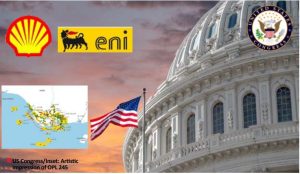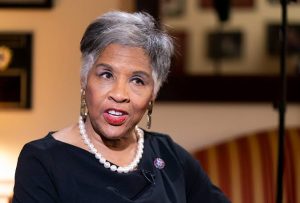*Petitions US Attorney General on matter *Asks Justice Dept to recommence probe
*Says Shell, Eni still profiting from fraud
 Chuks Isiwu
Chuks Isiwu
Lagos – The United States House of Representatives is pushing for the reopening of a Foreign Corrupt Practices Act, FCPA, investigation against multinational oil companies Shell and Eni regarding their 2011 purchase of the rights to the controversial Oil Prospecting License, OPL, 245, one of Nigeria’s most lucrative oilfields.
In a petition to Merrick Garland, Attorney General of the United States, urging the reopening of the investigation by the Department of Justice, DOJ, the House stated that “available evidence implicates both companies in a scheme that resulted in the payment of $1.1 billion in bribes to Nigerian government officials, including then-President Goodluck Jobathan”.
“Shell and Eni, both registered with the U.S. Securities and Exchange Commission (SEC) continue to profit from the deal in violation of the FCPA,” read the letter dated May 8, 2024 and signed by Representative Maxine Waters of the Committee on Financial Services, and Representative Joyce Beatty of the Subcommittee on National Security, Illicit Finance, and International Financial Institutions
The House maintained, in the letter to the Attorney General, that “allegations of corruption surrounding OPL 245 began in 1998, when Dan Etete, a convicted money launderer and Nigeria’s former Oil Minister during the military dictatorship of General Sani Abacha, awarded the OPL 245 license to Malabu Oil and Gas, a company whose principal shareholders were revealed to be Etete himself and the son of General Abacha”.
The rights to OPL 245 continued to be marred with corruption and in 2000, Malabu’s share registry was changed to reflect a 505 shareholding by Pecos Energy, a company secretly controlled by then-President Obasanjo and his Vice President, the letter stated, adding that Malabu’s license was revoked in 2001 but restored in 2006, with evidence suggesting that bribes paid to then-Attorney General Bayo Ojo played a key role in that decision.
The House alleged that Shell and Eni then purchased the license from Malabu in 2011 for $1.3 billion with knowledge that a portion of the proceeds would be used to bribe numerous Nigerian officials, including then-President Goodluck Jonathan. It added that hundreds of millions of dollars passed through various Nigerian shell companies linked to Aliyu Abubakar, a businessman known in his country as “Mr. Corruption”.
“Then-President Goodluck Jonathan was said to have pocketed some $200 million from the sale, and the former Attorney General involved in the 2006 reinstatement of Malabu’s license also purportedly received a sizeable payout
“Other funds would later be traced to the purchase of real estate in the U.S., Dubai, Brazil, and Switzerland, as well as luxury vehicles and gems,” the House petition also read.
 In fther urging the re-opening of the case, the House stated that the harm to the Nigerian people would continue to be felt beyond the immediate payment of bribes, with experts alleging that the country lost $6 billion in estimated future revenue – double the size of Nigeria’s annual health and education budget.
In fther urging the re-opening of the case, the House stated that the harm to the Nigerian people would continue to be felt beyond the immediate payment of bribes, with experts alleging that the country lost $6 billion in estimated future revenue – double the size of Nigeria’s annual health and education budget.

According to the petition, in 2013, there was sufficient evidence for the Federal Bureau of Investigation, FBI, and the money laundering investigation into the deal, which was followed by an FCPA investigation. In 2019, the DOJ notified Eni that the U.S. had closed the inquiries in light of Italy’s own prosecution of the case, yet it noted that the file could be reopened if circumstances changed.
The House noted that Shell and Eni were subsequently acquitted by the Italian court yet the companies “continue to profit from their exploitation of the OPL 245 deal.”
It is in this regard that the House is calling on the U.S. authorities to reopen the case against the multinational oil companies.
“The United States has consistently demonstrated global leadership in the fight against foreign bribery, with the FCPA serving as model legislation for countries around the world.
“The reopening of the of the case would further illustrate the U.S. commitment “to aggressively pursue foreign bribery cases,” as stated in the U.S. Strategy on Countering Corruption and reaffirm its pledge to fully implement the OECD Anti-Bribery Convention.
“We urge you to leverage this portent anti-corruption law to address the issues in the case and to send a powerful message that the United States stands vigilant in its pursuit of corporate crime around the globe,” the House petition to the Attorney General further read.
Shell, Eni acquittal
A court in Italy, in March 2021, cleared the Italian energy group Eni and British oil and gas company Shell over the allegations of corruption in the long-running case centred around the $1.3 billion (£936 million) purchase of the offshore oil block, OPL 245, in 2011.
Against the allegations by the prosecution that the majority of the money was used to bribe Nigerian politicians and officials, the court in Milan said the two firms, and 13 defendants, including past and current executives, had no case to answer.
Both companies and the accused managers, including Eni boss Claudio Descalzi, have repeatedly denied wrongdoing.
Their acquittal came more than three years after the trial began, and there had been dozens of hearings in the time.
However, the ruling can be appealed against.
Reacting to the court ruling, the manager’s lawyer said the verdict “finally restores (Mr) Descalzi’s professional reputation and Eni’s standing as a large company”.
Shell also welcomed the ruling, noting that the trial had been a “difficult learning experience”.
“We have always maintained that the 2011 settlement was legal (and) designed to resolve a decade-long legal dispute,” the company said in a statement.
But shortly after the firms were cleared, the Nigerian government said it was “disappointed” in the ruling.
“This is a huge blow for natural resource governance and transparency in Nigeria,” Matthew Page, an associate fellow at the Chatham House Africa programme, was quoted as saying. “This judgment will continue to sting,” he added.
Nigeria’s appeal rejected
An appeals court in Milan, Italy, in November 2022, also rejected Nigeria’s request for $1.1 billion compensation against Shell and Eni in civil proceedings relating to the $1.3 billion oilfield deal.
“We are pleased that these civil proceedings have been dismissed,” Shell said in an emailed comment.
“This follows the Milan criminal tribunal’s finding that there was no case to answer for Shell or its former employees when they were fully acquitted in 2021, a decision that was upheld in July 2022, when criminal proceedings ended,” it added. Eni dis not comment on the ruling.
This article was originally posted at sweetcrudereports.com
Be the first to comment